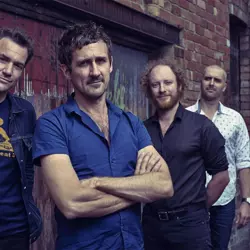 The Drones
The DronesThe Drones long-awaited sixth album, I Sea Seaweed – eight complex lyrical tracts as dense and draining as they are invigorating and illuminating – exhibits an epic intensity from the get-go, a lengthy vocal passage at the start of the opening title track bursting into a maelstrom of noise at the chorus, frontman Gareth Liddiard offering a resigned “And ain't that just the way things are” as viciously poignant as it is balefully nihilistic. Liddiard's uber expressive voice like a bludgeon and his intellect a scalpel, nipping and tucking its way into the very depths of your psyche, while the band offer up a squall of visceral and emotive music in the best tradition of the swampy Australian rock'n'roll lineage to which they belong.
Liddiard's 2010 solo album, Strange Tourist, seems to have subtly influenced the writing, as has the stripped-back Fairfield Warehouse Session from 2011's The Thousand Mistakes DVD – the quiet/loud dynamic is used to killer effect, and keyboardist Steve Hesketh's move to a full-time role really enhances the band's aesthetic. Restrained single, How To See Through Fog, and the upbeat A Moat You Can Stand In are all killer, and when Liddiard mangles the chorus to Nine Eyes (“Yeah I'm all I need/I'm finally on my own”, complete with gorgeous backing from bassist Fiona Kitschin) he sounds unhinged a la Kurtz in Conrad's Heart Of Darkness, before the album ends in trademark style with the cerebral headfuck of Why Write a Letter That You'll Never Send.
More than just a great rock band, The Drones are like a mirror to the soul of our society, or that void where it used to exist. Exhilarating.
















